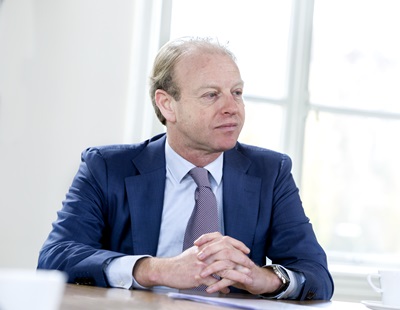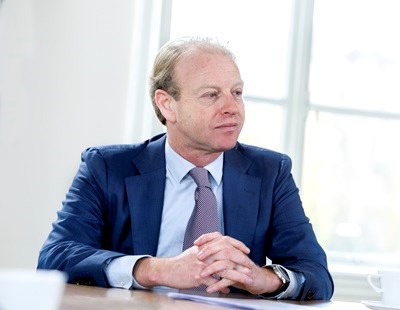7 April 2020 - Last month on the occasion of his company's annual financial performance announcement, Yoram Knoop, CEO at ForFarmers, stressed that 2019 was a difficult and turbulent year.
“We see market circumstances in which we operate changing rapidly,” he said, adding that besides increasing public and political pressure regarding the environmental impact, the sector is also facing animal disease challenges such as African swine fever and bird flu, which remain a concern.
Last year, ForFamers sold over 10.1 million tonnes of feed and saw its gross profit drop 0.6% to EUR 440.7 million.
“These are turbulent times and a new market reality is appearing rapidly,” Knoop said.
Yoram Knoop, who is also part of the Feedinfo Leaders Network and will be contributing to the next Feedinfo Summit alongside other industry leaders, provided Feedinfo News Service with an insight in ForFarmers’ cost-saving strategy which is still underway, the company’s priorities in the months to come, as well as his views on the COVID-19 situation our sector is dealing with today.
|
Yoram Knoop |
Addressing COVID-19 first, Knoop argued that it is still too early to tell what impact coronavirus will have on the European feed sector this year. “We can assume that demand will continue to be robust because there is a stimulus right now as governments are promoting the consumption of animal proteins,” he commented. “It is more at export level that challenges may be expected, which could eventually lead to drops in demand for animal protein. But there is no reason to assume at this point in time that there will be a material effect on our business.” |
In Knoop’s view, COVID-19 may actually result in rise in awareness and a re-emphasis on remaining safe and healthy – a message that will resonate well at consumer level.
“Our sector on the contrary will likely be revitalized and consumers will increasingly understand the importance of keeping control on the food chain,” he said.
Public sentiment vis-à-vis food safety or animal welfare will only become more prominent and more influential, and so will the carbon footprint of animal husbandry in relation to climate change.
Still with the consumer in mind, one question that will likely be asked at the future Feedinfo Summit is ‘How do we as an industry tackle misconceptions about the livestock value chain?’
For ForFarmers’ CEO, the Summit will be a good place to gather and address the underlying concerns. But ultimately it is up to the industry to make sure that there’s less reason for consumers to blame our sector.
“The consumer doesn’t have the full understanding of the complexity of what we do in our industry. Regardless of that, we have to do a better job in articulating our answers to their concerns,” he commented.
ForFarmers itself will continue to focus on efficiency of resource use and production - a key trend in the years to come.
“We will be announcing our new a strategy for the years 2020-2025 during our Capital Markets Day after the publication of our half-year 2020 results which takes place mid-August,” Knoop said. “You can expect a strong sustainability commitment from us, be it in terms of raw materials use, CO2 emissions or climate change, improving feed conversion ratios by monitoring changes as best we can via various tools and data compiled by our customers. We are gearing up for a strong engagement plan.”
Unfortunately the ongoing political debate about reducing nitrogen emissions is creating an uncertain outlook for livestock farming. For ForFarmers, it has become clear government measures in countries such as the Netherlands and Germany will eventually lead to a small decline in animal numbers.
“We expect some Western European countries to reduce herds and subsequently there will be a reduction in feed demand, perhaps in the Netherlands and Germany,” Knoop argued.
Fortunately, ForFarmers’ joint venture partner Tasomix (in which it has a 60% stake) has seen its volumes increase in the growth market that is Poland, where it entered two years ago.
“The poultry and swine businesses we have are doing well in Poland,” Knoop said. “Although African swine fever has been in Poland for quite a while, the impact on our pig feed operations there is minimal.”
He added: “In Poland, we have seen significant growth in poultry but bird flu has been a setback and some operations had to be curtailed. The record growth that the Polish poultry market was seeing is impacted in the short-term. And right now it is hard to predict when the bird flu situation will be under control.”
Knoop pointed out: “Right now, in all countries where ForFarmers is active, except Poland, markets are seeing growing overcapacity and increasing competition because of declining volumes. There is sufficient feed production capacity in the market today, but some feed suppliers will either have to choose to idle capacity or seek to consolidate with others.”
“ForFarmers, meanwhile, is seeking a much more agile model by optimizing its own production activities as well as working with partners,” he added.
For instance, in August 2019, the company dropped plans to build a feed mill in Wesel, West Germany and instead, said it would focus on finding strategic partners and continue to create outsourcing opportunities that would provide better flexibility to support the company’s growth in Germany.
It has been a year since ForFarmers said it would be looking at reducing the number of mills it operates across its international business units, except in Poland, over 2019-2020.
Via this cost-saving initiative, the company is hoping to unlock EUR10 million in savings whilst rationalize its supply chain. And wherever possible, production will be combined in existing mills. This entailed that some mills were to be enhanced or modernised.
Providing an update on the project, Knoop said: “We are on track to unlock EUR 10 million in savings in 2021 compared to 2018. We closed 5 of our 40 feed mills in 2019 (2 in the Netherlands, 2 in the UK and 1 in Belgium).
In the Netherlands, ForFarmers transferred the production activities of Van Gorp Bio in Schalkwijk to Reudink in Lochem. Feed production was also moved from its Helmond location to other ForFarmers mills in Almelo, Deventer (Netherlands) and in Rees (Germany).
In the UK, ForFarmers closed its feed site in Blandford, Dorset and transferred production activities to its other sites in Exeter, Devon (conventional feed) and Portbury, Somerset (organic feed). And the company closed its feed mill in Crewe, moving production to facilities in Newcastle under Lyme, Selby and Preston.
“With these 5 closures we have made significant strides towards that EUR 10 million target,” Knoop said.
And finally, in Knoop’s opinion, ForFarmers can continue to play a part in industry consolidation.
He pointed out that his firm continues to look for the right acquisition opportunities, even during these more complicated COVID times.





